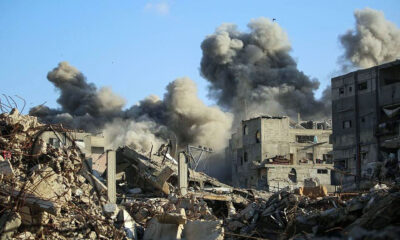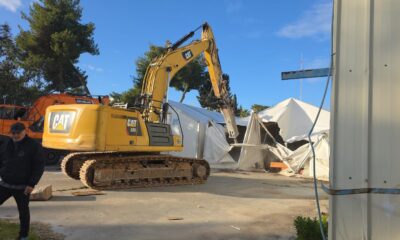International
Netanyahu vows to increase military pressure on Hamas
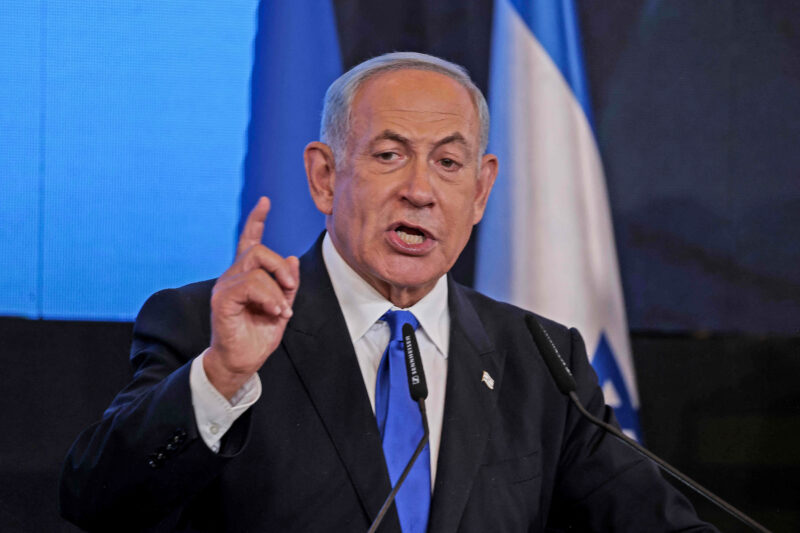
Netanyahu vows to increase military pressure on Hamas
Israel will increase ‘military pressure’ on Hamas in a bid to secure the release of hostages held in Gaza, Prime Minister Benjamin Netanyahu has vowed.
Netanyahu threatened action ‘in the coming days’ and promised Israeli forces would ‘deliver additional and painful blows’ without specifying further.
Despite an international outcry, Netanyahu has repeatedly said that the army will launch a ground assault on Rafah, a southern Gaza city so far spared an Israeli invasion where more than 1.5 million Palestinians have taken refuge.
Israeli strikes on Rafah overnight killed 22 people, including 18 children, health officials said Sunday.
The premier’s latest remarks came a day after US lawmakers approved $13 billion in new military aid to close ally Israel, even as global criticism mounts over the dire humanitarian crisis in the besieged Gaza Strip.
Hamas, whose October 7 attack triggered the Gaza war, said the US aid was a ‘green light’ for Israel to ‘continue the brutal aggression against our people’.
Netanyahu, in a video statement on Sunday, the eve of the Jewish holiday of Passover, said Israel ‘will deliver additional and painful blows’ to Hamas.
‘In the coming days we will increase the military and political pressure on Hamas because this is the only way to free our hostages,’ he said.
‘We will land more and painful blows on Hamas – soon.’
Israel estimates 129 captives remain in Gaza after the October 7 Hamas attack, including 34 who the military says are dead.
READ ALSO:
- Reno Omokri to Obidients: Name one school Peter Obi initiated as Anambra gov
- Suspected killers of Kaduna seminarian who burnt Catholic parish still in prison custody – Police
- Kano Agency: How we traced over N50 billion LG funds diverted by Ganduje
The army has said at least some of the hostages are held in Rafah, which has so far been spared an Israeli invasion and is where most of Gaza’s 2.4 million people have sought shelter.
Earlier this week, the G7 group of developed economies said that it opposed a ‘full-scale military operation’ there, fearing ‘catastrophic consequences’ for civilians.
Israeli forces had already been carrying out regular strikes on the city.
Netanyahu has faced pressure within Israel, with an anti-government rally in Tel Aviv on Saturday demanding action to secure the release of hostages.
Ofir Angrest, whose brother Matan was kidnapped on October 7, called for Jewish Israelis to leave an empty chair at their Seder meals, marking the beginning of Passover on Monday, to remember the captives.
Israel has carried out near-daily air raids on Rafah, where more than half of Gaza’s population of 2.3 million has sought refuge from fighting elsewhere.
The first Israeli strike in Rafah killed a man, his wife and their 3-year-old child, according to the nearby Kuwaiti Hospital, which received the bodies. The woman was pregnant and the doctors saved the baby, the hospital said. The second strike killed 17 children and two women from an extended family.
‘These children were sleeping. What did they do? What was their fault?’ asked one relative, Umm Kareem. Another relative, Umm Mohammad, said the oldest killed, an 80-year-old aunt, was taken out ‘in pieces.’ Small children were zipped into body bags.
Mohammed al-Beheiri said his daughter, Rasha, and her six children, the youngest 18 months old, were among those killed. A woman and three children were still under the rubble.
The Israel-Hamas war has killed over 34,000 Palestinians, according to local health officials, at least two-thirds of them children and women.
It has devastated Gaza’s two largest cities and left a swath of destruction. Around 80 per cent of the territory’s population have fled to other parts of the besieged coastal enclave.
The $26 billion aid package approved by the US House of Representatives on Saturday includes around $9 billion in humanitarian assistance for Gaza, which experts say is on the brink of famine. The Senate could pass the package as soon as Tuesday, and President Joe Biden has promised to sign it immediately.
The conflict, now in its seventh month, has sparked regional unrest pitting Israel and the US against Iran and allied militant groups across the Middle East. Israel and Iran traded fire directly this month, raising fears of all-out war between the longtime foes.
READ ALSO:
- JAMB sanctions officials for asking candidate to remove Hijab
- MKO family disowns late patriarch’s widow championing Yoruba Nation cause
- Biden considers $1bn weapon package for Israel
Tensions have also spiked in the Israeli-occupied West Bank. Israeli troops killed two Palestinians who the military says attacked a checkpoint with a knife and a gun near the southern West Bank town of Hebron early Sunday.
The Palestinian Health Ministry said the two killed were 18 and 19, from the same family. No Israeli forces were wounded, the army said.
The Palestinian Red Crescent rescue service said it had recovered 14 bodies from an Israeli raid in the Nur Shams urban refugee camp in the West Bank that began late Thursday. Those killed include three militants from the Islamic Jihad group and a 15-year-old boy.
The military said it killed 14 militants in the camp and arrested eight suspects. Ten Israeli soldiers and one border police officer were wounded.
In a separate incident in the West Bank, an Israeli man was wounded in an explosion Sunday, the Magen David Adom rescue service said.
A video circulating online shows a man approaching a Palestinian flag planted in a field. When he kicks it, it appears to trigger an explosive device.
At least 469 Palestinians have been killed by Israeli soldiers and settlers in the West Bank since the start of the war in Gaza, according to the Palestinian Health Ministry. Most have been killed during Israeli military raids, which often trigger gunbattles, or in violent protests.
The war in Gaza was sparked by an unprecedented Oct. 7 raid into southern Israel in which Hamas and other militants killed around 1,200 people, mostly civilians, and abducted around 250 hostages. Israel says militants are still holding around 100 hostages and the remains of more than 30 others.
Thousands of Israelis have taken to the streets to call for new elections to replace Netanyahu and a deal with Hamas to release the hostages. Netanyahu has vowed to continue the war until Hamas is destroyed and all the hostages are returned.
The war has killed at least 34,097 Palestinians and wounded another 76,980, according to the Gaza Health Ministry. The ministry does not differentiate between combatants and civilians in its count. It says the real toll is likely higher as many bodies are stuck beneath the rubble or in areas that medics cannot reach.
Israel blames Hamas for civilian casualties because the militants fight in dense, residential neighborhoods. The military rarely comments on individual strikes, which often kill women and children. The military says it has killed over 13,000 Hamas fighters, without providing evidence.
Netanyahu vows to increase military pressure on Hamas
dailymail
International
Israeli Settlers Torch, Deface West Bank Mosque During Ramadan
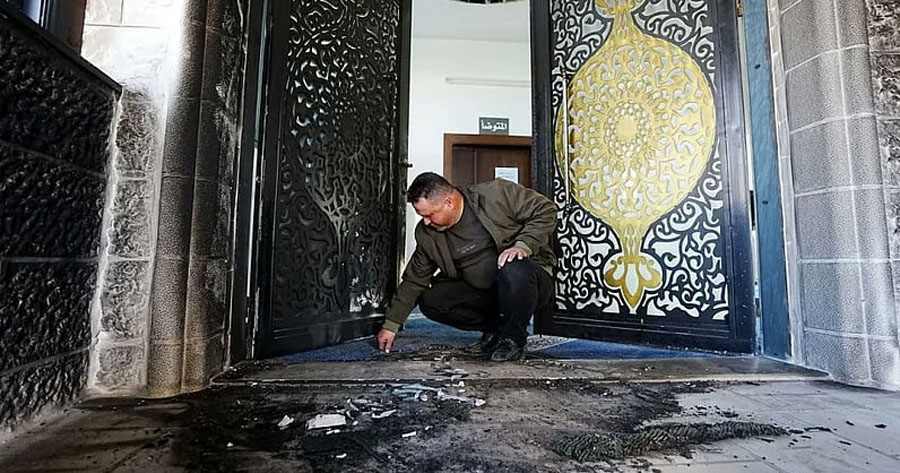
Israeli Settlers Torch, Deface West Bank Mosque During Ramadan
TELL, West Bank — Israeli settlers have vandalized and set fire to the Abu Bakr al-Siddiq Mosque in the Israeli-occupied West Bank, authorities confirmed, marking the latest in a series of attacks on Palestinian religious sites amid a surge in settler violence. The attack occurred early Monday during the Muslim holy month of Ramadan.
Worshippers arriving for morning prayers discovered the mosque’s entrance smoldering, with black smoke staining the doorway and broken glass scattered across the area. According to the Palestinian Authority Ministry of Religious Affairs, settlers spray-painted offensive graffiti, including derogatory references to Islam and slogans linked to extremist “price tag” operations.
Local resident Munir Ramdan described the scene: “I was shocked when I opened the door. The fire had been burning here, the glass was broken, and the door was damaged.” Security footage reportedly shows two individuals carrying gasoline and spray paint approaching the mosque before fleeing the scene.
READ ALSO:
- Iranian Army Helicopter Crashes Into Market, Four Killed
- Mother of Three Dies by Suicide After Fiance’s Family Rejects Marriage in Ijebu-Ode
- RCCG Pastor Peter Akpe Confirmed as Bayelsa Deputy Governor
The incident is part of a broader pattern of attacks on mosques in the West Bank, with the Palestinian Ministry of Religious Affairs reporting that 45 mosques were vandalized or attacked last year. Residents said the assault was a deliberate provocation during Ramadan, targeting both the religious sanctity of the mosque and the spiritual practice of fasting.
The Israeli military and police responded to reports of the incident and are actively searching for suspects. While the military condemned harm to religious institutions, Palestinian officials and rights groups say Israeli authorities often fail to hold settlers accountable for violence.
The attack comes amid a recent rise in settler violence, including last week’s killing of a 19-year-old Palestinian-American, Nasrallah Abu Siyam, highlighting ongoing tensions between settlers and Palestinian communities in the occupied territories.
Israeli Settlers Torch, Deface West Bank Mosque During Ramadan
International
Iranian Army Helicopter Crashes Into Market, Four Killed
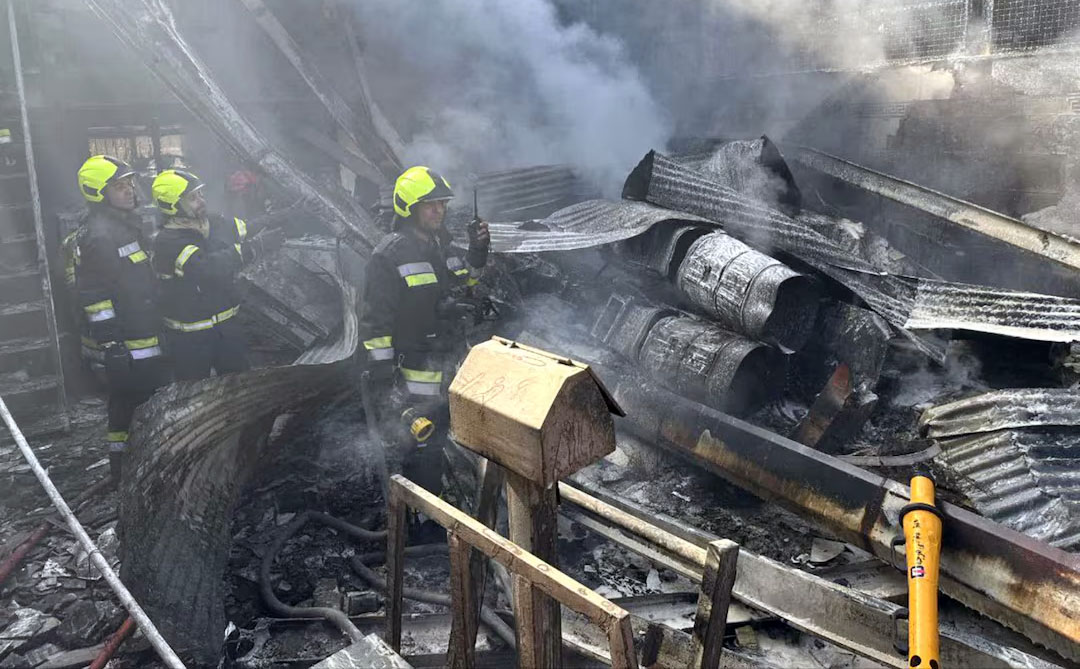
Iranian Army Helicopter Crashes Into Market, Four Killed
At least four people have died after an Iranian Army helicopter crashed into a fruit and vegetable market in Dorcheh, central Iran, on Tuesday morning, authorities and state media reported.
The helicopter, reportedly on a training flight, went down around 9:09 a.m. local time, striking market stalls and sparking a fire, which was later extinguished by emergency responders. Among the deceased are the pilot and co-pilot, both members of the Iranian Army Aviation, and two civilians who were present at the market during the crash.
Officials indicated that a technical malfunction may have caused the accident, though a full investigation is ongoing to determine the exact circumstances. Local authorities and rescue teams were immediately dispatched to secure the scene, assist victims, and clear debris from the market area.
READ ALSO:
- Mother of Three Dies by Suicide After Fiance’s Family Rejects Marriage in Ijebu-Ode
- RCCG Pastor Peter Akpe Confirmed as Bayelsa Deputy Governor
- BREAKING: El-Rufai Asks Court to Quash DSS Charges, Demands ₦2bn Damages
Dorcheh, located about 330 km south of Tehran, is in a region hosting key military installations, including a major airbase. The crash adds to concerns over the safety of Iran’s aging military aircraft fleet, which has been affected by decades-long sanctions restricting access to spare parts and modern equipment.
This incident comes days after another military aircraft crash in Hamadan province, where an F‑4 fighter jet went down during a training flight, killing one of its pilots. Aviation safety remains a growing concern in Iran, particularly for military training operations.
Authorities have pledged a comprehensive investigation into the Dorcheh helicopter crash and have called for measures to ensure safety around public areas near military flight paths.
Iranian Army Helicopter Crashes Into Market, Four Killed
International
15 Killed as Peruvian Military Helicopter Crashes During Flood Relief Mission
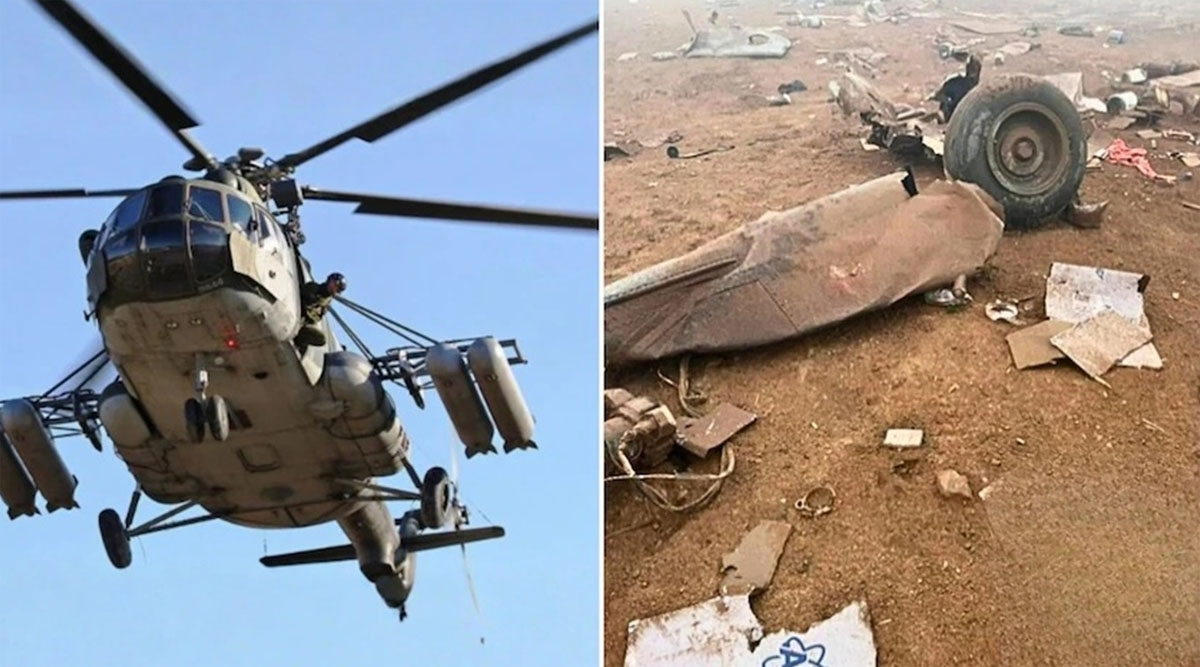
15 Killed as Peruvian Military Helicopter Crashes During Flood Relief Mission
At least 15 people, including seven children, were killed after a Peruvian Air Force Mi‑17 helicopter crashed on Sunday while carrying out a flood relief and rescue mission in the Arequipa region of southern Peru. The helicopter was part of a humanitarian assistance operation responding to severe flooding and landslides that have damaged homes, roads, and infrastructure across the region.
The Mi‑17 helicopter, carrying 11 passengers and four crew members, vanished from radar while flying from Pisco toward the coastal town of Chala Viejo in Caravelí Province. Loss of radio contact triggered an intensive search and rescue operation, involving Peruvian special forces, police units, and Air Force personnel, which located the wreckage on Monday.
Among the victims were seven minors aged between 3 and 17 years old. Adults confirmed dead include Colonel Javier Nole Gonzales, Air Force officer Sergio Danner Paucar Centurión, Elisa Bernal Paredes, Zoila Fernandez Medina, Luis Cárcamo, Kamila Jove, and Leiner Huamán, along with other passengers whose identities are being verified. All four crew members perished in the crash.
READ ALSO:
- Nigeria Allegedly Paid Boko Haram to Free Abducted Schoolchildren, Teachers – AFP Report
- Ijebu Ruling House Appeals to Tinubu to Resolve Awujale Stool Deadlock
- Human Rights Lawyer Says Amupitan’s INEC ‘Failed Woefully’ in FCT Election
The Peruvian Air Force (FAP) described the incident as a “tragic accident” and expressed its deepest condolences to the families of the victims. An Accident Investigation Board has been activated to determine the exact cause of the crash, including the possibility of mechanical failure, adverse weather conditions, or operational challenges.
This tragedy comes amid one of the most severe flood emergencies in Arequipa in recent years, with heavy rains causing rivers to overflow, landslides, and forced evacuations. The helicopter’s mission was intended to provide emergency relief, transportation of personnel, and logistical support to affected communities. Authorities warned that the loss of the aircraft and personnel may impact ongoing rescue operations.
Local officials and disaster response teams continue to assist flood-affected families, providing temporary shelters, food, and medical aid. Observers noted that the crash underscores the risks faced by rescue teams operating in disaster-prone regions and highlights the need for enhanced aviation safety measures in extreme weather conditions.
15 Killed as Peruvian Military Helicopter Crashes During Flood Relief Mission
-

 Business2 days ago
Business2 days agoDangote Opens Refinery Investment to Nigerians With Public Share Sale Plans
-

 News5 hours ago
News5 hours agoBREAKING: IGP Kayode Egbetokun Steps Down as Tinubu Names Tunji Disu as New Police Chief
-

 Education3 days ago
Education3 days agoUTME: JAMB Clarifies Position on Hijab During Biometric Capture
-

 Politics2 days ago
Politics2 days agoTinubu Hails Wike as APC Dominates 2026 FCT Area Council Elections
-

 Entertainment2 days ago
Entertainment2 days agoRegina Daniels Takes Delivery of ₦150m 2026 GAC Trumpchi M8 SUV
-

 Politics2 days ago
Politics2 days agoFCT Council polls: APC Wins Four Chairmanship Seats as PDP Takes Gwagwalada
-

 News2 days ago
News2 days agoYoruba Muslim Group Dismisses Viral Ramadan Date Claim, Reaffirms Sultan of Sokoto’s Authority
-

 Politics2 days ago
Politics2 days agoOpposition Weakens as Another Governor Eyes APC Move



